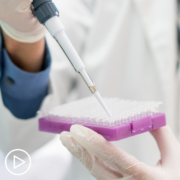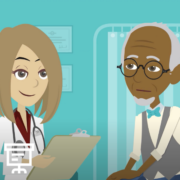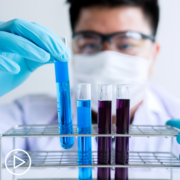Staying Updated on AML Research News: Advice From an Expert
Staying Updated on AML Research News: Advice from an Expert from Patient Empowerment Network on Vimeo.
Dr. Jeffrey Lancet, an AML expert from Moffitt Cancer Center, shares tips for sifting through research news and encourages communication with your healthcare team about what you’ve learned.
Dr. Jeffrey Lancet is Chair and Program Lead in the Department of Malignant Hematology at Moffitt Cancer Center in Tampa, FL. He is nationally and internationally recognized for his clinical research in the field of acute leukemias. Learn more about Dr. Lancet, here.
Related Resources:

|

|

|
Transcript:
Katherine:
Well, patients are often educating themselves about developing research and new treatment options. Do you have advice for patients who, when it comes to talking with their doctors about what they’ve learned?
Dr. Lancet:
I think it’s important for patients to speak to their doctors directly and as soon as possible as opposed to going on the internet and doing a Google search for this drug or that because every patient’s situation is unique and how to apply these new drugs is very different amongst patients.
And some patients may qualify for certain approaches and others do not. So, it’s very important to talk to your doctor about how you can individualize your treatment based upon your specific scenario. What type of mutation does a patient have, what is their level of fitness, are they potentially candidates for bone marrow transplant? Those are some of the basic questions that come up all the time to determine what is the best treatment approach.
And as we’re developing new therapies, and more of them, there will be more options for patients and a more personalized approach that can be taken that really can only be decided based upon that individual patient’s unique profile. So, it’s very important to really recognize that one size does not fit all when it comes to treatment of this disease and that certain drugs may be helpful and certain drugs may be unhelpful in that particular site.
Katherine:
What would you like to leave patients with today? Are you hopeful about the future of AML treatment and research?
Dr. Lancet:
Yes, I’m very hopeful. I think AML is a disease that is really a very diverse and complex one. It doesn’t lend itself well to huge immediate breakthrough therapies that will immediately change the landscape by double digit percentages for example. This is a disease that, again is very complex, and in which advances are made slowly but steadily. And I think we’ve seen that over the past to 5 to 10 years is that we are gradually incorporating new drugs into our treatment regimens with gradually increasing levels of success as we learn more about these drugs starting out as single agents and then beginning to combine them.
I think that we’re learning an awful lot about the molecular landscape about AML and how it impacts treatments and treatment decisions and prognoses. I think our ability now to detect what we recall measurable residual disease is very important. Also, because now we can get a grasp of how well our treatments are working and are we knocking out enough bad cells to expect good outcomes, and if we’re not, then hopefully we can intervene and kind of hit it while it’s down so to speak and use some of these new therapies to knock out what might be left over to give patients better overall long term responses and results.
So, definitely reason to be hopeful, but we have to stay patient as well. It’s difficult because it’s a, it’s a terrible disease but we have to recognize that it’s something that requires very careful research to develop the appropriate clinical trials that will have the highest chance of success.
Katherine:
Dr. Lancet, thanks so much for joining us today.
Dr. Lancet:
Thank you very much for having me. It was good to be with you and I appreciate the opportunity.
Katherine:
And thank you to our audience. I’m Katherine Banwell.



